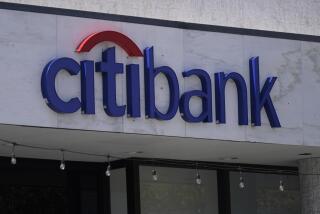Fed rejects Citigroup dividend, buyback plans after stress test
- Share via
WASHINGTON — Federal regulators rejected plans by Citigroup Inc. and four other large U.S. banks for dividend payments and stock buybacks after the latest round of stress tests.
The results raised concerns about weaknesses in the risk-planning processes of Citi and three of the banks, the Federal Reserve said Wednesday. It was the second time in three years that Citi failed a federal stress test.
Citi’s chief executive, Michael Corbat, said he was “deeply disappointed” by the Fed’s findings, asserting that the nation’s third-largest bank by assets was “one of the best-capitalized financial institutions in the world.”
Corbat complained that, because of past problems, the bank is “being challenged to meet the highest standards.”
The Fed said it has been raising its standards for how banks assess risk and plan to distribute capital.
Fed officials also rejected the capital distribution plan of the fifth bank, Zions Bancorporation, but for other reasons. The Fed was worried about Zions’ financial health during an extreme financial downturn. The firm’s subsidiaries include California Bank & Trust of San Diego, with 102 branches, mostly in Southern California.
The remaining 25 banks, among the nation’s 30 largest banking corporations, received regulatory approval to pay cash dividends and repurchase shares after the tests indicated that the firms could withstand a severe economic shock.
Two of those companies — Bank of America Corp. and Goldman Sachs Group Inc. — received approval only after scaling back their capital distribution plans in the last week.
Fed officials said this year’s results showed that the nation’s largest banks now were better able to handle a deep recession than they were when the first stress tests were done in the aftermath of the 2008 financial crisis.
Fed Gov. Daniel K. Tarullo, who oversees the central banks regulatory functions, said banks and regulators have more work to do “to raise expectations for the quality of risk management.”
The 30 banks have a combined $13.5 trillion in assets, nearly 80% of the U.S. industry. This year, the Fed expanded the number of banks tested to 30 from 18.
Zions’ plan was rejected because it would leave the firm at risk of failure in a deep recession. It was the only bank that effectively failed the first round of stress tests released last week. Those tests did not take into account each bank’s dividend and stock-buyback plans for this year.
Zions said it would submit a new capital plan for regulatory approval. Last week, the bank said it had divested some high-risk holdings to help it raise a key measurement the Fed uses in its tests.
The other three banks that, along with Citigroup, had problems in their planning processes were HSBC North America Holdings Inc., RBS Citizens Financial Group Inc. and Santander Holdings USA Inc.
All three are U.S. subsidiaries of major foreign banks. The Fed tested only the subsidiaries.
Executives at the three banks said they were well capitalized but would continue to work to meet the Fed’s rising standards.
“The Fed requires us to improve our process, and we will do so,” said Gerard Mattia, chief financial officer of HSBC North America.
The Fed said Citi and the three foreign-owned subsidiaries showed weaknesses in drawing up their capital distribution plans, such as how they assessed risk and modeled potential losses.
The banks can’t increase their dividend payments or stock buybacks this year, but are allowed to duplicate last year’s distributions when they resubmit new plans to the Fed for approval.
Bank of America and Goldman Sachs reduced their planned capital distributions to shareholders after getting the results from the first round of tests last week. Under their original distribution plans, both firms had ratios of debt to equity that were too high, the stress tests found.
Citigroup will be allowed to keep paying its tiny annual dividend of 4 cents a share through the first quarter of next year and to continue a modest $1.2-billion program to buy back its own common stock.
But the Fed rejected Citi’s plan to reward shareholders with a $6.4-billion stock buyback over the coming year and to increase the annual dividend to 20 cents a share.
Puzzanghera reported from Washington and Reckard from Los Angeles.
More to Read
Inside the business of entertainment
The Wide Shot brings you news, analysis and insights on everything from streaming wars to production — and what it all means for the future.
You may occasionally receive promotional content from the Los Angeles Times.











